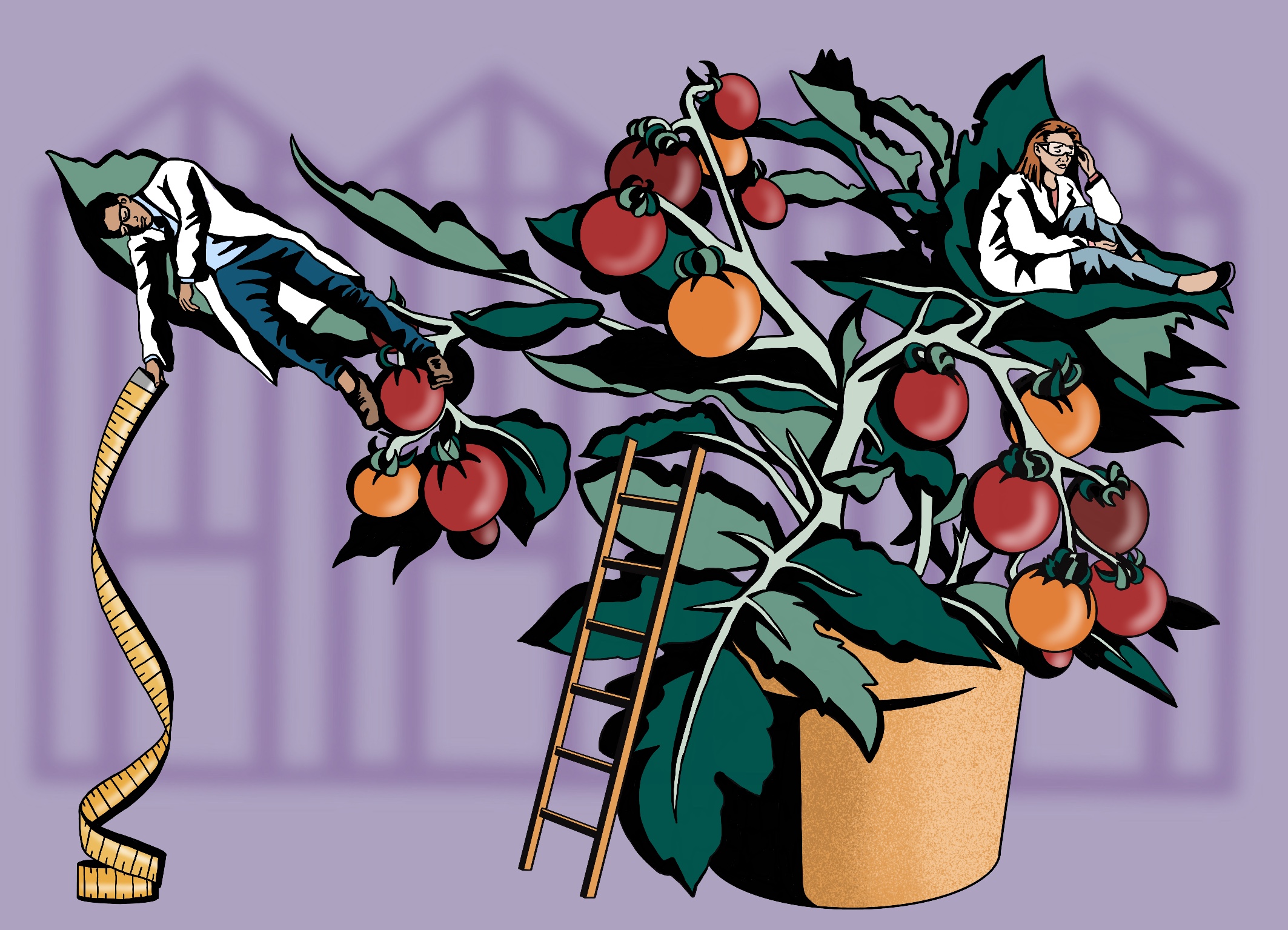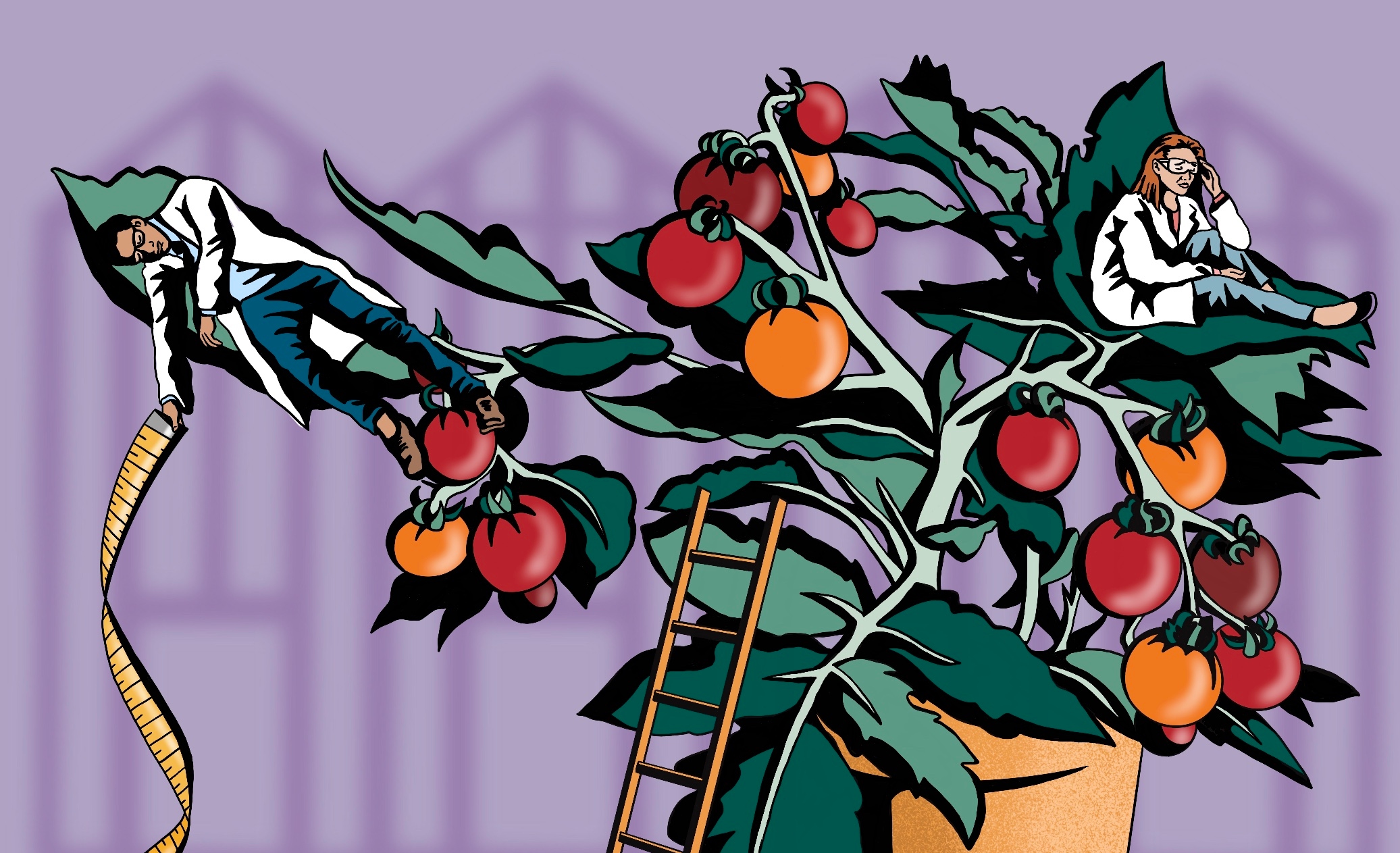Now that we are back on campus after two strange Covid years, no one could deny that work pressure has got worse rather than better. With the summer holiday in sight – and who isn’t in need of it? – it is time to go into action on solving this. For real this time.
Joshua Dijksman is an associate professor of Physical Chemistry and Soft Matter and represents the FNV trade union in a process known as the Local Consultation (Lokaal Overleg, see inset). In the latter capacity, he pays close attention to developments in the collective labour agreement (CAO). This year, work pressure was an important issue at the negotiating table – and by no means for the first time. Enough to make you despair? Yes and no, he thinks. ‘It is quite embarrassing that the problem still persists despite years of campaigning and protests. And WUR does acknowledge that too. What I find positive about the new university CAO, apart from the section on pay, is that it expresses a clear commitment to really fleshing out solutions that can reduce the work pressure.’
Why is work pressure such a persistent problem?
‘One of the reasons is that most scientists love their work and tend to be willing to go the extra mile. If recruitment was to dry up, there would be a much greater incentive to address the work pressure. But the reality is that there are too many rather than too few applicants for an academic career. So it is standard in the scientific community to work on in the evenings and weekends. Another factor is that many scientists feel a strong competitive urge to more or less set up their own business. As a result, you sometimes find the same mentality at universities as in start-ups, with alpha males (and females) working 80 to 100 hours a week, staying overnight in their offices if necessary, and thinking that’s okay. We know that this can result in a highly toxic work culture.’
That assumes that the solution lies with the scientists: just stop working so hard.
‘That is an oversimplification. But the solutions don’t have to be enormously complicated. More support staff would solve a lot of problems at WUR, for example.’
But the solutions don’t have to be enormously complicated
‘The number of support staff has remained constant for years, which is astonishing in view of the big growth in the number of students and the huge increase in scientific output. Over the past 15 years, the number of lecturers at WUR has increased sixfold, but the administrative support they get has not kept pace at all.’
Are you arguing for even more flexible workers?
‘No! Continuity is important. To cite an example: WUR uses agency workers to check the student cards at exams. Unfortunately, these workers often fail to show up. Then the teachers have to check the student cards themselves. There is no time to do that, so you often don’t bother. Why aren’t permanent support staff available to do this? It’s not as if WUR only runs three exams a year… You get good work from people who don’t have to be re-trained every time; who get the chance to gain experience and therefore get better and more efficient at the job. These are the advantages of offering people good career prospects.’
Does this apply to lecturers and researchers too?
‘I think it is most obvious in the case of lecturers. There are always teaching tasks – in fact, they are our core business – and the university is largely financed by the government for them. From that perspective, it is strange that nearly 50 per cent of Wageningen lecturers are on flexible contracts. In research, it seems harder to offer people good career prospects, because research is nearly always funded on a project basis. Which, incidentally, is another thing that increases the work pressure, because your funding simply ends at some point. But in research too, there is something to be said for having a fixed cohort of researchers – like experts in software, data management or other crucial research infrastructure: the kind of knowledge that is needed in almost every project. The Dutch Research Council is already pondering ways of embedding this kind of knowledge, but we should give it more thought at the local Wageningen level as well.’
Because knowledge retention and continuity affect not just work pressure but also quality?
‘What is more, knowledge retention and continuity are non-negotiable conditions for quality. It is much more efficient to organize things well, so you can accrue long-term knowledge. The solutions to this go beyond just pulling out your wallet – which is not necessarily the most sensible way to relieve the work pressure. In my opinion, lasting solutions lie more in “clear career prospects for lecturers that do justice to what they do for the universities”, in the words of the trade unions. WUR already has some good initiatives. Examples are the EduHubs at the Plant Sciences Group and the Environmental Sciences Group, or the team of lecturers at Agrofood technology & Food Sciences Group, who can teach various courses that are run every year, so those lecturers get very good at them. But you must give those people a permanent contract, otherwise you’ll lose them again. WUR is one of the best universities in the world. So we should have the courage to make the investments needed to keep up that high standard.’
Local Consultation seeks input
The CAO for Dutch Universities includes a number of points on which further agreements must be made by individual universities (i.e. locally) on the precise details regarding things like work pressure, tenure track arrangements or social safety. The body that makes these agreements with the Executive Board and sees to it that they are carried out correctly is called the Local Consultation, or Personnel Affairs Consultation WU (OPWU). A number of WU colleagues represent their unions in these consultative bodies. Wageningen Research has its own collective agreement, with a local Periodic Consultation WR (POWR). OPWU and POWR work closely together. The WUR Council does not formally have a role in drawing up the CAO but it is an important sounding board. If you have ideas, about how to reduce the work pressure for instance, the Local Consultation invites you to share them, for example by sending an email to joshua.dijksman@wur.nl.
Research creates a stir
The Employee Monitor has been highlighting the high work pressure for years. In the 2021 edition, 44 per cent of respondents said the work pressure was too high or much too high. WUR announced that it wanted to conduct a follow-up study to get a better idea of the causes. That created a stir, with criticism both of the substance of the plan (‘waste of money, this is the umpteenth study on work pressure – better to invest that time and energy in lasting solutions’) and of the process: several colleagues are not amused that WUR is planning to share data from the Staff Monitor with an external research agency. The study has now been shelved in view of the concerned reactions.
‘The work pressure definitely hasn’t declined. Until recently I thought nothing was really being done about it, but I’ve discovered WUR is looking at how to cut the internal bureaucracy: the administrative red tape and unwieldy IT systems. Hopefully that will make a real difference in the workload in the foreseeable future. Even so, the main reason for the work pressure — the systematic underfunding of universities — has still not been resolved.’
Han Wiskerke, professor of Rural Sociology
‘Nothing has improved for me since last year. It feels as if WUR is making the employee responsible for tackling the work pressure. They offer courses on working more efficiently, put out fresh fruit and give staff the opportunity to relax with a massage at the office. That’s all very well, but it leaves us saddled with the real problem.’
Michiel Köhne – assistant professor in the Anthropology of Law
‘Although I am still experiencing the tail end of the Covid overload, I see improvements in the work pressure. There were far more changes to the education administrative systems during the Covid crisis, but now the university is restricting that again. We also discuss work pressure openly in our group. You really feel supported then. However, I would like more time to work on the connections with lecturers outside my group because I get a lot of pleasure from those connections and they also reduce the work pressure.’
Jet Vervoort – lecturer in Nematology

 ‘The mentality at universities can be the same as in start-ups, with alpha males (and females) working 80 to 100 hours a week, staying overnight in their offices if necessary, and thinking that’s okay. We know that can result in a very toxic work culture.’ llustration Valerie Geelen
‘The mentality at universities can be the same as in start-ups, with alpha males (and females) working 80 to 100 hours a week, staying overnight in their offices if necessary, and thinking that’s okay. We know that can result in a very toxic work culture.’ llustration Valerie Geelen 

